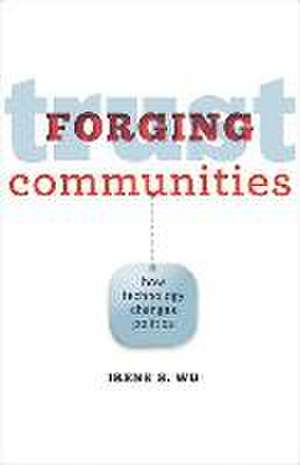Forging Trust Communities – How Technology Changes Politics
Autor Irene S. Wuen Limba Engleză Paperback – 3 aug 2015
Wu illustrates the rich world history of citizens and leaders exercising political power through communications technology. People in nineteenth-century China, for example, used the telegraph and newspapers to mobilize against the emperor. In 1970, Taiwanese cable television gave voice to a political opposition demanding democracy. Both Qatar (in the 1990s) and Great Britain (in the 1930s) relied on public broadcasters to enhance their influence abroad. Additional case studies from Brazil, Egypt, the United States, Russia, India, the Philippines, and Tunisia reveal how various technologies function to create new political energy, enabling activists to challenge institutions while allowing governments to increase their power at home and abroad.
Forging Trust Communities demonstrates that the way people receive and share information through network communities reveals as much about their political identity as their socioeconomic class, ethnicity, or religion. Scholars and students in political science, public administration, international studies, sociology, and the history of science and technology will find this to be an insightful and indispensable work.
Preț: 120.66 lei
Preț vechi: 153.97 lei
-22% Nou
Puncte Express: 181
Preț estimativ în valută:
23.09€ • 24.17$ • 19.10£
23.09€ • 24.17$ • 19.10£
Carte indisponibilă temporar
Doresc să fiu notificat când acest titlu va fi disponibil:
Se trimite...
Preluare comenzi: 021 569.72.76
Specificații
ISBN-13: 9781421417264
ISBN-10: 142141726X
Pagini: 176
Ilustrații: 10, 2 black & white halftones, 8 black & white line drawings
Dimensiuni: 140 x 215 x 11 mm
Greutate: 0.23 kg
Editura: Johns Hopkins University Press
ISBN-10: 142141726X
Pagini: 176
Ilustrații: 10, 2 black & white halftones, 8 black & white line drawings
Dimensiuni: 140 x 215 x 11 mm
Greutate: 0.23 kg
Editura: Johns Hopkins University Press
Notă biografică
Descriere
Scholars and students in political science, public administration, international studies, sociology, and the history of science and technology will find this to be an insightful and indispensable work.
